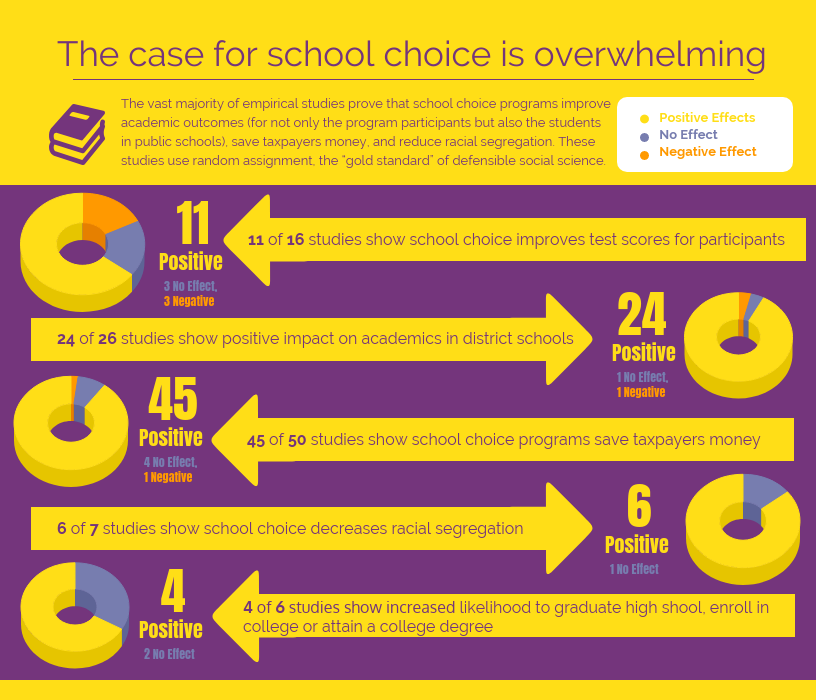The consensus is that school choice works
A new misleading and inaccurate article attacking the success of school choice programs is making its way through the media world, most recently appearing in the Columbia Daily Tribune.
The article, co-authored by anti-choice researcher Christopher Lubienski, alleges there is a new consensus emerging that school choice programs have no or negative impacts on student learning.
This is simply not true.
In fact, a meta-analysis of studies on private school choice has shown participants see gains equivalent to an additional 49 days of learning in math and 28 more days of learning in ELA.
The prevailing consensus, based on empirical research, is that school choice helps to improve test scores in both private and public schools, helps to lower the cost of education, helps to reduce racial segregation and helps more students attend and graduate from college.

But Lubienski, after arguing that most empirical studies on school choice are crafted by researchers Lubienski claims are beholden to think-tanks (no mention of his own association with the NEA) and displaying the obligatory picture of Betsy DeVos, seems to only want to focus on cherry-picked results from one state for his main argument.
He briefly mentions recent studies of Ohio, Washington D.C., and Indiana (that show school choice students experiencing declines in math achievement in the first year or two in the program, but then improving scores in years three and four) but focuses on two single takeaways from a recent set of studies on school choice in Louisana.
The problem is that those two takeaways – that students in a Louisiana voucher program underperformed on math in years one, two and four of the study and that students in Louisiana’s voucher program had no greater chance of going to college than their peers – only tell half the story of what is happening for school choice students in Louisiana.
The full story, based on the study, is that Louisiana’s voucher program was poorly designed and rushed to implementation resulting in a unique and sub-optimal environment for school choice success.
Unequal testing
The first problem is that, like Missouri, Louisiana has had three different tests over the past four years making it hard to fully gauge the impact of school choice on student test scores.
In years one, two, and four of the study (the years where voucher students underperformed), the state used a testing system that was not only closely aligned with the curriculum in traditional district schools but that was also tied to high stakes impacts for those districts.
The result is that public district schools were both better prepared and more motivated to get higher scores on these tests than their private school counterparts.
Lower level of private schools participating
The second issue with using Louisiana as an argument against school choice in other states is the way Louisiana’s voucher program was designed.
Louisiana already has some strong school choice options including charter schools and tax benefits for parents sending their children to private schools. Its voucher program is designed to help lower-income students who may not be able to take advantage of other options, but it ties any private schools that participate in the program to state tests, financial disclosures, and strict enrollment policies.
As a result, researchers found that only 30 percent of Louisiana private schools choose to participate in the voucher program and that a large percentage of those schools were some of the lowest quality privates schools in the states.
Schools participating in the program had lower tuitions, enroll fewer students per grade, and have smaller school staffs than nonparticipating private schools in the state
In fact, the study shows that voucher students who went to the higher performing private schools actually outperformed their traditional district peers.
Other positive impacts
Lubienski also fails to mention a number of other positive and significant impacts identified by the Louisiana voucher impact research. These include:
- Competition from the voucher program had a significant positive impact on traditional district school test scores, helping to raise educational outcomes for students across the state.
- The voucher program helped to reduce segregation across the state — both in private schools and in public schools.
- The voucher program had a significant positive impact on public school budgets and if it were to end it would create a significant fiscal squeeze if voucher students were to return to public schools.
« Previous Post: Why Missouri students need choice
» Next Post: CSI Schools: Where they are and what their test scores are